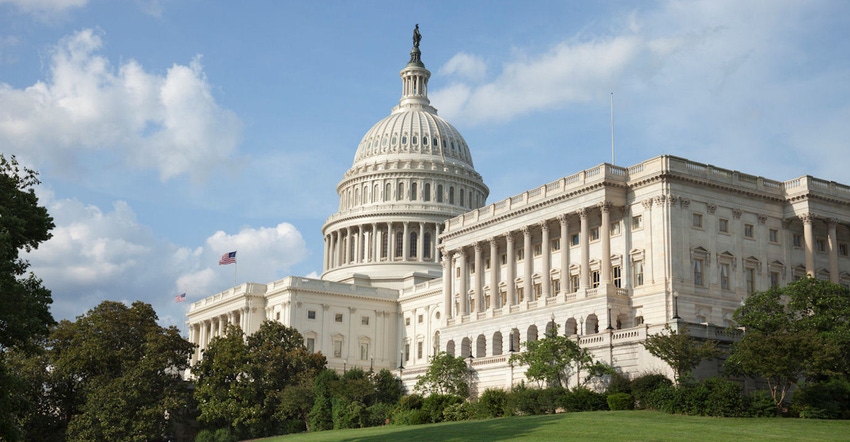USDA has withdrawn livestock portion of GIPSA rule and will continue to work on poultry fair practice issues in future rule-making.

Mainstream livestock and farm groups welcomed the U.S. Department of Agriculture's announcement this week to withdraw two rules related to the Packers & Stockyards Act, commonly referred to as the “GIPSA rules.” However, the praise was not universal.
In defending the agency’s action, Agriculture Secretary Sonny Perdue said the concern with the rule as proposed was that it would lead to unnecessary and unproductive litigation. He said his goal is to make sure those on the production side as well as the buying and processing sides can abide by the USDA motto to “do right and feed everyone.” He said he will continue to make sure those in production are treated fairly and not in a predatory fashion.
Perdue explained that sometimes there are more actions that he believes regulations and litigation don’t solve. “This had the potential for harming people that it was intended to protect -- and in an unwise way,” Perdue said.
Sens. Chuck Grassley (R., Iowa) and Jon Tester (D., Mont.), the only two farmers currently serving in the U.S. Senate, wrote to Perdue expressing their “vehement” disagreement with USDA’s decision.
The senators noted that the livestock industry has consolidated for decades, enabling a handful of companies to exert market power that puts smaller-scale, often family-run farming and ranching operations at a significant disadvantage.
“Recognizing that fact, Congress intentionally instructed the secretary of agriculture to promulgate new rules in the 2008 farm bill to ensure a better-functioning marketplace for farmers and ranchers in the livestock and poultry industry,” the senators wrote to Perdue. “We look forward to working with you and the department to ensure everyone in agriculture is getting a fair shake so rural America can thrive again.”
In a letter to USDA staff, Randall Jones, acting administrator of the Grain Inspection, Packers & Stockyards Administration (GIPSA), said “USDA and GIPSA remain committed to protecting fair trade practices, financial integrity and competitive markets for livestock, meat and poultry.
“After careful consideration of public comments, we are withdrawing the (interim final rule) IFR regarding the scope of Sections 202(a) and (b) of the Packers & Stockyards Act," Jones added. "As many public comments noted, the purpose of the act is to protect competition, not individual competitors. Additionally, the IFR conflicted with case law, which Congress has declined to overturn through legislation. Withdrawal of the IFR is also consistent with President (Donald) Trump’s executive order to reduce regulations and control regulatory costs.”
National Farmers Union president Roger Johnson said, “The withdrawal of the competitive injury rule is unjustified, given the long-held plain language interpretation by the department that growers do not need to prove harm to the entire industry when seeking relief from poultry companies for unfair contract practices. It is particularly egregious given the abuses that poultry growers face in the vertically integrated marketplace.”
The U.S. Cattlemen’s Assn. said it has been committed to seeing through necessary clarifications to the Packers & Stockyards Act, and a withdrawal of the rule does not solve the problems in today’s marketplace. “Anticompetitive buying practices and the lack of true price discovery remain critical issues to our industry and ones that must be addressed,” association president Kenny Graner said.
Zippy Duvall, president of the American Farm Bureau Federation, said although USDA withdrew the livestock portion of the GIPSA rule, it appears that USDA will continue to work on the poultry fair practices issue in a future rule-making, which he said is "good news for farmers and ranchers.”
The Farm Bureau contends that the livestock side of the rule would have disrupted key marketing arrangements in the livestock sector, which is one of the key arguments against the bill posed by the National Pork Producers Council and the National Cattlemen’s Beef Assn.
“As to the Unfair & Undue Preferences rule, we encourage the agency to continue to work toward solutions that protect our farmers and ranchers from unjust practices and strengthen GIPSA’s ability to enforce these issues. In particular, we urge the department to continue working to achieve more fairness for growers. The USDA can and should stop predatory practices that continue in the chicken industry,” Duvall said.
The National Farmers Union said it will “pursue congressional action that addresses competition issues and protects family farmers and ranchers.”
So, it appears that this discussion is far from over, as Congress will again be asked to step in.
About the Author(s)
You May Also Like




.png?width=300&auto=webp&quality=80&disable=upscale)
